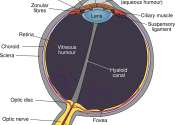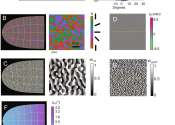Last update:
Ophthalmology news
Psychology & Psychiatry
From field to lab: Study reveals how people with vision loss judge approaching vehicles
Patricia DeLucia has spent decades studying something many of us never think about: judgments about collisions that are crucial for safety. But the roots of her research stretch back to her childhood, long before she became ...
10 hours ago
0
0
Breaking down barriers to accessing dementia-friendly eyecare
New accessible resources aim to make it easier for people with dementia and their families to access dementia-friendly eyecare.
Dec 3, 2025
0
0

Compounded imiquimod ointment may be beneficial for some ocular surface cancers
Compounded imiquimod 5% ointment may be safe and effective for diffuse conjunctival melanoma in situ (MIS) or ocular surface squamous neoplasia (OSSN), according to a case series study published online Nov. 26 in JAMA Ophthalmology.
Dec 1, 2025
0
0

Dual mechanisms drive rapid eye dominance plasticity in the adult brain, study reveals
Studies have shown that even a few hours of monocular deprivation can markedly improve the visual function of the deprived eye in adults. However, the underlying neural mechanisms of this ocular dominance plasticity remain ...
Nov 26, 2025
0
77

Virtual retina could help unlock new vision loss treatments
New computer modeling could help scientists better understand how the retina regenerates, opening the door to new treatments for vision loss, according to a study from the University of Surrey.
Nov 25, 2025
0
0

Bringing AI into the NICU: How algorithms may help infants' eyes, health
When ophthalmologist Emily Cole, MD, steps into the neonatal intensive care unit (NICU) at Children's Hospital Colorado to evaluate an infant's eyes for a disease called retinopathy of prematurity (ROP), it's not uncommon ...
Nov 25, 2025
0
0

Gas-permeable lenses beneficial after congenital glaucoma surgery
For children undergoing primary congenital glaucoma (PCG) surgery, use of rigid gas-permeable contact lenses (RGPCLs) is associated with superior visual acuity compared with spectacles, according to a study published online ...
Nov 25, 2025
0
0

Access to ophthalmologists improved from 2014 to 2024, research shows
Overall access to ophthalmologists improved from 2014 to 2024, according to a research letter published in JAMA Ophthalmology.
Nov 25, 2025
0
0

New platform tests AI fairness and accuracy in diabetic eye disease screening
Researchers have developed the world's first real-world head-to-head testing platform to determine whether commercial artificial intelligence (AI) algorithms are fit for NHS use to detect disease in a fair, equitable, transparent ...
Nov 24, 2025
0
1

Reducing inflammation may protect against early age-related macular degeneration-like vision loss
University of Minnesota Medical School researchers have shown that reducing chronic inflammation can significantly protect against age-related macular degeneration (AMD)-like pathology in preclinical models. The findings ...
Nov 21, 2025
0
62

Shimmering calcium waves shape eye development, fruit fly study suggests
For just a few hours, shimmering waves of calcium move through cells in the developing eyes of fruit flies. These spontaneous waves serve a purpose, enabling communication between cells and shaping the eye structure, according ...
Nov 20, 2025
0
8

Scientists use stem cells to model rare genetic blindness in children
Researchers at the Eye Genetics Research Unit at Children's Medical Research Institute (CMRI) are the first in the world to use stem cells to study one of the genetic causes of Leber Congenital Amaurosis (LCA)—a rare condition ...
Nov 20, 2025
0
0

Vision can be rebooted in adults with amblyopia, study suggests
Temporarily anesthetizing the retina briefly reverts the activity of the visual system to that observed in early development and enables growth of responses to the amblyopic eye, new research shows.
Nov 19, 2025
0
67

Flexible organic electrodes convert infrared light into nerve signals in damaged retinas
In an important step toward visual prostheses, biocompatible electrodes can convert infrared light into nerve impulses, as demonstrated by a team at TU Wien.
Nov 19, 2025
0
0

Loss of key visual channel triggers rhythmic retinal signals linked to night blindness
Rhythmic electrical activity in the retina (known as pathological oscillations) has been observed in several eye diseases, including congenital stationary night blindness (CSNB) and retinitis pigmentosa (RP). These oscillations ...
Nov 18, 2025
0
0

Brain stimulation found to improve vision recovery after stroke
Scientists at EPFL have developed an innovative, non-invasive brain stimulation therapy to significantly improve visual function in stroke patients who have suffered vision loss following a stroke. The approach could offer ...
Nov 17, 2025
0
39

Virtual reality tool may offer easier vision testing, early research shows
Could a virtual reality headset offer a cheaper, easier, and more comfortable method of testing a person's vision, particularly among patients with a degenerative eye condition called geographic atrophy? It's a question that ...
Nov 12, 2025
0
0

VR headsets may actually reduce risk of dry eye
Virtual reality (VR) gaming has gained significant attention in recent years, with an increasing number of users integrating VR and immersive headsets into their daily lives. These devices provide highly immersive visuals, ...
Nov 11, 2025
0
23

Protecting against diabetic corneal disease
A Cedars-Sinai study helps explain why half of diabetes patients experience deterioration of the cornea, the transparent dome-shaped outer layer of the eye that provides protection and focuses incoming light. The findings, ...
Nov 10, 2025
0
0

Time change: What neuroscience reveals about our internal clock
It's well-known that neural circuits help synchronize our biological clock with the day-night cycle. But just how exactly do those circuits develop, and can better understanding the process help, for example, in treating ...
Nov 7, 2025
0
10

Temporal artery ultrasound in the real-time diagnosis of stroke of the eye
For most of us, the phrase "stroke of the eye" sounds like a metaphor. But for UK HealthCare's Jagannadha "Jay" Avasarala, M.D., Ph.D., it's a literal and urgent diagnosis—one that could mean the difference between sight ...
Nov 7, 2025
0
2

Scientists create artificial retina phantom to standardize eye disease diagnosis equipment
The Korea Research Institute of Standards and Science (KRISS) has developed a retina-mimicking eye phantom that faithfully replicates the structural layers and microvascular network of the human retina. This innovation provides ...
Nov 5, 2025
0
2

Demystifying a visual illusion: Why we see color that's not there
A new discovery has unraveled why we sometimes see colors that aren't there. The phenomenon of "color afterimages" is when you see illusory—or false—colors after staring at real colors for a longer time. Through this, ...
Nov 4, 2025
0
26

Childhood blindness: Recommended realignment of prevention, medical treatment in development cooperation
International health policy and German development cooperation focus primarily on preventive measures. This is evident, for example, in diseases such as childhood blindness, which can be prevented through vaccinations or ...
Nov 4, 2025
0
0













































